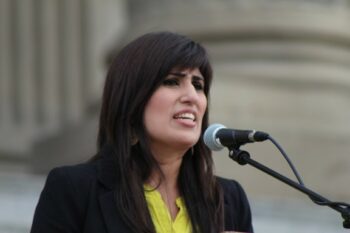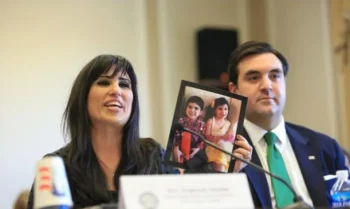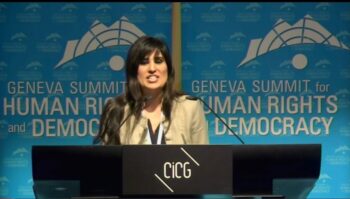After affirming with her signature that she was Muslim upon entering Iran, Naghmeh Panahi felt crushed with remorse for “having denied her Lord,” so she begged Jesus for a second chance to own up for her Savior.
That chance came two years later, when she was arrested and threatened by the burly head of the detention center who demanded her confession. It would be the grounds of her execution, he snarled.
“I ended up sharing my testimony,” Naghmeh says on a Back to Jerusalem YouTube video. “Long story short at the end of the whole ordeal, this man ended up crying and asking for a Bible. The guards saw it. By God’s grace, I was able to say, I’m a Christian. Not only did he release me, but his heart was softened to the gospel.”

Naghmeh Panahi was born in Iran. Her father traced his family line directly to the Prophet Mohammad. He was extremely devout.
But Naghmeh and her brother wondered how God could allow the carnage and destruction they saw on their way to school. Iran was in the throes of an eight-year war against Iraq that wasted away the population.
Naghmeh’s parents became alarmed when her twin brother was being recruited to engage in jihad. Iran used little boys to clear mind fields for soldiers. The boys exploded the mines and died, so the soldiers could pass through unharmed, Naghmeh says.
 To avoid such a fate, her family emigrated to the United States. Thrust in a very different environment, Naghmeh’s twin was introduced to Christ and excitedly told Naghmeh, who received Jesus with joy. They began reading the Bible.
To avoid such a fate, her family emigrated to the United States. Thrust in a very different environment, Naghmeh’s twin was introduced to Christ and excitedly told Naghmeh, who received Jesus with joy. They began reading the Bible.
Naghmeh didn’t get far. She had read Psalm 1 and was starting Psalm 2, which says, Ask of me, and I will give you nations. Her mother discovered her and snapped the Bible away. The fact that the kids of a family descended from Mohammad would become apostates was a family crisis, which they attempted to solve by moving to Idaho, where Dad was offered a job.
But Naghmeh began to ask God for nations.
Not until Naghmeh left home for college did she attend church and read a Bible again. Affirming her Christianity was her college rebellion stage, she quips.
 As a result of the discipleship she received in college was born the crazy plan to go to Iran as a 20-something missionary in 2001. It was right after 9/11, and the plane was empty as people were fearful to fly, much less to a terrorist-prone nation like Iran.
As a result of the discipleship she received in college was born the crazy plan to go to Iran as a 20-something missionary in 2001. It was right after 9/11, and the plane was empty as people were fearful to fly, much less to a terrorist-prone nation like Iran.
Upon entry, immigration demanded she sign as to her religion. She was aware that the scripture said, “If you deny me before men, I will deny you before my father.” But she was very much afraid and filled in “Muslim” on the line.
Her heart was smitten with guilt. She pleaded with the Lord for another chance. She would not deny him, she resolved.
Having slipped into Iran, Naghmeh got involved in the underground home church movement on the cusp of revival of thousands of salvations. Personally, she led hundreds in sinner’s prayer, she says.

She met and married Pastor Saeed Abedini, a prodigious and fearless Christian worker who planted churches in 33 cities, she said.
Getting arrested for Christian evangelism became a regular feature.
In one of those arrests, she affirmed her faith to the violent Revolutionary Guard detention center chief, whose heart was softened towards her and the gospel.
Eventually, the persecution became too intense and she and her husband, now with two small children, sought asylum in the US.
Saeed didn’t adapt well. He was used to full-time large-scale ministry and working a boring 9-to-5 job didn’t appeal to him, Naghmeh says. He began flying back to Iran and continued ministering there.
 As was to be expected, he was arrested, and this time he wasn’t going to be released for a very long time. Naghmeh prayed and fasted for her husband. When after months, nothing seemed to help, she decided to bring the story to Fox News. After the article attracted huge attention, Sean Hannity interviewed her and others in the media.
As was to be expected, he was arrested, and this time he wasn’t going to be released for a very long time. Naghmeh prayed and fasted for her husband. When after months, nothing seemed to help, she decided to bring the story to Fox News. After the article attracted huge attention, Sean Hannity interviewed her and others in the media.
Naghmeh was thrust into a new role of advocating for her husband and for all persecuted Christians. She spoke at the White House with Barak Obama and with Donald Trump. She spoke before Congress, the United Nations, the parliament of Holland. Everywhere she went, she talked not only about the plight of her husband but also presented the gospel.
It was the fulfillment of her childhood prayer from Psalm 2, to evangelize the nations.
Naghmeh had speaking engagements and huge churches and large conferences every week.
 If she was at a hotel in New York and found out that Iranian officials were also staying there, she chased them down and demanded to know why they were persecuting Christians. She even cornered the President of Iran to give him a scolding.
If she was at a hotel in New York and found out that Iranian officials were also staying there, she chased them down and demanded to know why they were persecuting Christians. She even cornered the President of Iran to give him a scolding.
If she did that in Iran, she would be summarily executed. But here in America, the bad boys couldn’t do anything.
Naghmeh was a celebrity, and her husband was a cause célèbre.
But there was a dark side to the story that she never shared. Her husband was abusive and cheated on her.
Because she believed in the institution of marriage and wanted desperately for her kids to have a father, because she was steeped in Iranian culture both from her home in America and while living in Iran, she dared not call out the abuse. Instead, she prayed.
 But the nightmare in her life burst suddenly and unexpectedly into the foreground. At a large church in North Carolina, she broke down to the pastor and his wife after speaking. She unburdened herself with tears and confessions. The pastor, she said, was a PhD in psychology and diagnosed her with suffering from spousal abuse.
But the nightmare in her life burst suddenly and unexpectedly into the foreground. At a large church in North Carolina, she broke down to the pastor and his wife after speaking. She unburdened herself with tears and confessions. The pastor, she said, was a PhD in psychology and diagnosed her with suffering from spousal abuse.
She had never heard of that, she says, and looked it up. Sure enough, all the symptoms listed on the internet coincided with her husband. He was a high-flying minister who lived off of adrenaline and ego and did not do well with down time.
Like some other mega personalities in Christianity (Ravi Zacharias, Teg Haggard, for example), there were skeletons in the closet (only these skeletons were still alive and well, not secret sins from the past).
Naghmeh reached out to close friends with a text explaining she was a victim of spousal abuse. She sent the text before boarding a plane. When she got off the plane, her phone was lit up with requests for interviews from multiple media; the story had leaked.
 It was a confusing revelation for much of Christianity. Suddenly, the ideal pastoral couple unjustly persecuted by the evil Iranian empire was a muddled picture. Was Saeed a hero? Why did it seem that Naghmeh was changing the story?
It was a confusing revelation for much of Christianity. Suddenly, the ideal pastoral couple unjustly persecuted by the evil Iranian empire was a muddled picture. Was Saeed a hero? Why did it seem that Naghmeh was changing the story?
If the revelation was confusing for the church, it was even more confusing for Naghmeh. Overnight, she became a pariah of the American church. “My whole world crumbled. I lose everything,” she says.
“Franklin (Graham) asked me if I was cheating on Saeed,” she says on a Julie Roys video. “It was really heart-breaking to be called a cheater and someone who did it for fame or for money.”
Immediately, Naghmeh disappeared from social media. She was dropped from the speaker’s circuit.
She spent a lot of time in prayer.
Six weeks after revealing her husband’s abuse, Saeed was released from the Iranian jail. He would have received a hero’s welcome. Instead, Christians were cautious.
Saeed went with his wife, who was learning to stand up for herself, she says. She laid out boundaries. He could no longer bully her.
Saeed initiated divorce proceedings, she says.
Only six years after her divorce did she emerge into low profile ministry of helping refugees around her home. Used to advocating for persecuted Christians abroad, Naghmeh found herself thrust into a new role, that of advocating for abused wives. She spent her kid’s college money helping women get lawyers to get free from abusive husbands, she says.
It’s less glamorous, but it’s still serving the needy. She is co-founder and executive director of Tahir Alnisa (Setting Women Free) Foundation to help domestic abuse victims. Her book I Didn’t Survive: Emerging Whole After Deception, Persecution, and Hidden Abuse tells more.
“Walking with Christ is actually the cross,” she says. “It’s a hard road of continual death to self, of not getting the glory. John the Baptist said, ‘I must decrease and he must increase.’”
To learn more about a personal relationship with Jesus, click here
About this writer: Michael Ashcraft pastors a church in the San Fernando Valley of Los Angeles.




